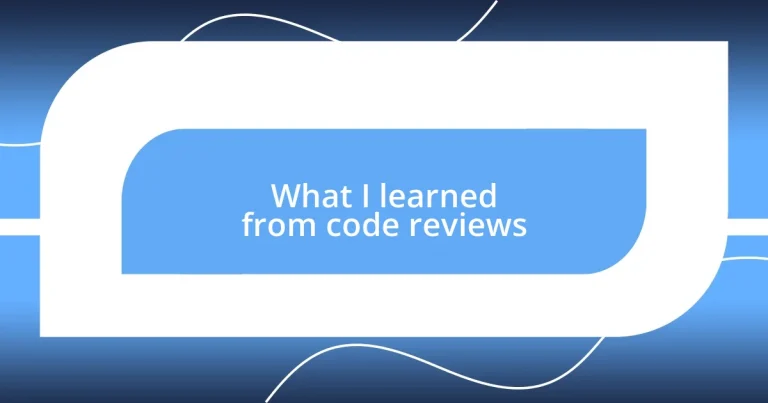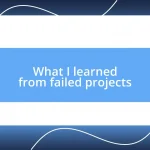Key takeaways:
- Code reviews enhance collaboration and code quality by allowing developers to learn from diverse perspectives and catch potential issues early.
- Effective communication is essential in code reviews, emphasizing the need for specific feedback and encouraging dialogue for constructive growth.
- Implementing best practices and regularly exploring new technologies based on feedback fosters a culture of continuous learning and skill improvement among team members.
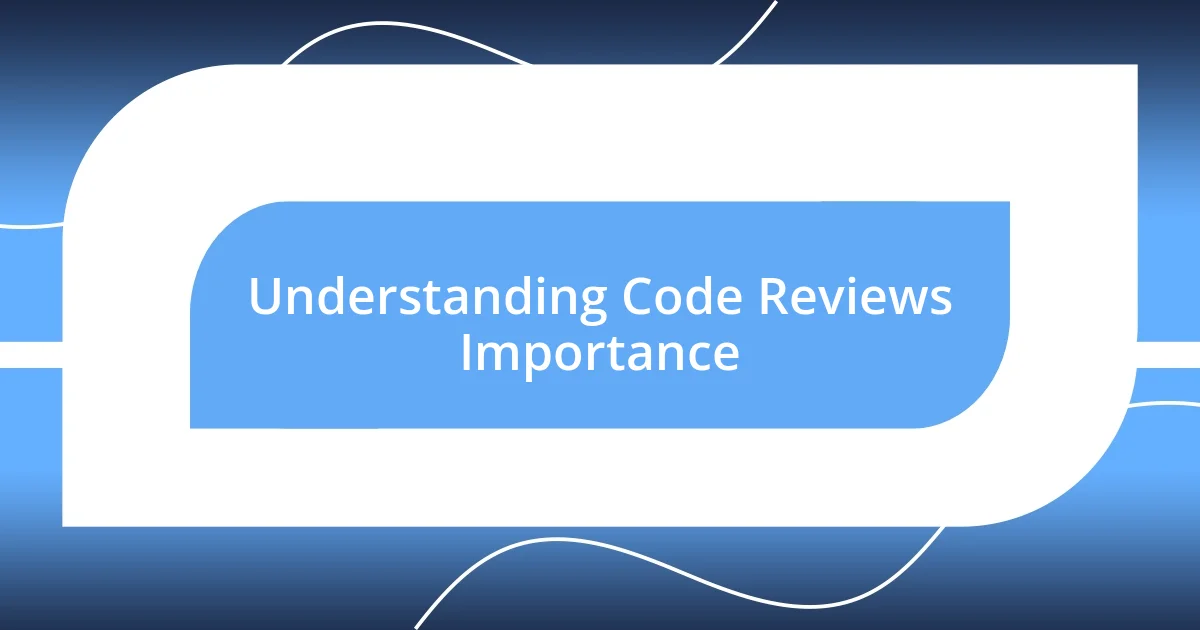
Understanding Code Reviews Importance
Code reviews may seem time-consuming, but their importance cannot be overstated. I remember my early days as a junior developer; my first code review felt like a rite of passage. What I didn’t realize at the time was how these reviews were shaping my understanding of best coding practices and enhancing collaboration among team members.
One of the biggest benefits of code reviews is the opportunity to learn from others with different perspectives and experiences. I once took a shortcut in my code that seemed efficient at the moment, but my reviewer pointed out potential pitfalls I hadn’t considered. This experience made me appreciate that code reviews foster an environment where constructive criticism can thrive, ultimately leading to better code quality.
Have you ever faced a bug that left you scratching your head for hours? I certainly have. Code reviews often catch these issues before they escalate, saving time, and frustration. They act as a safety net, ensuring that mistakes get addressed early in the development process, ultimately building a more robust product.
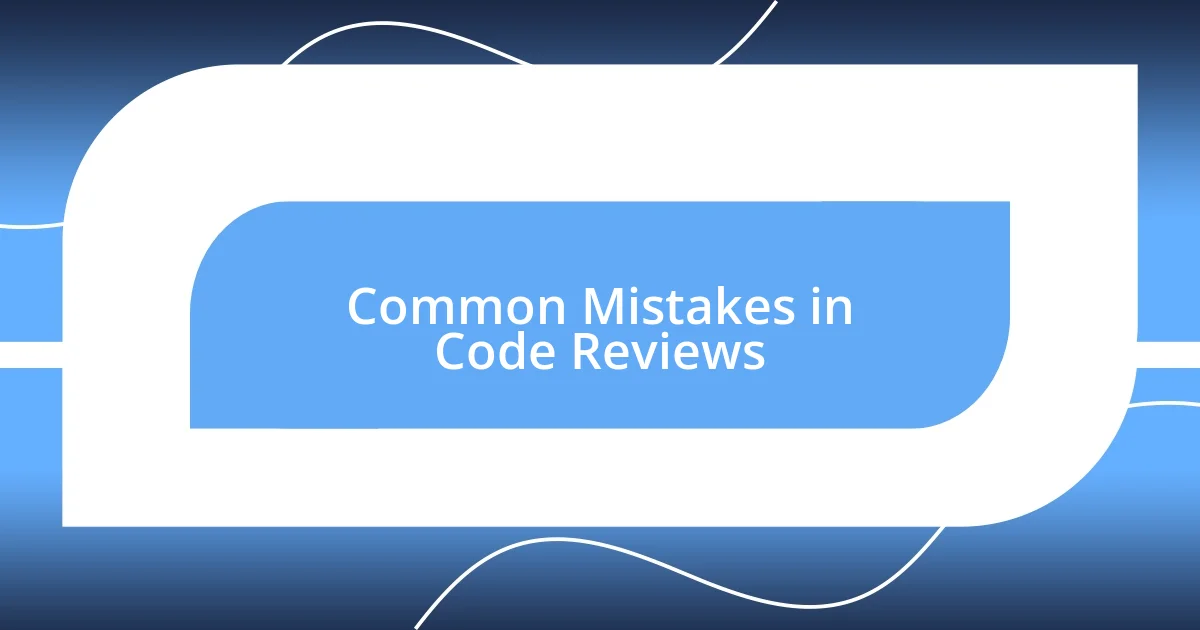
Common Mistakes in Code Reviews
In my experience, one of the most common mistakes in code reviews is focusing too heavily on minor issues, like naming conventions or formatting, rather than addressing the core functionality or logic of the code. Early in my career, I remember pouring over feedback that highlighted every little typo while the fundamental logic remained unchallenged. This often leads to an unproductive cycle where developers feel overwhelmed by nitpicking instead of gaining meaningful insights into more significant problems.
Here are some frequent pitfalls to avoid during code reviews:
- Ignoring the overall architecture: Ensure that the changes align with the project’s broader goals.
- Not providing constructive feedback: Aim to educate rather than criticize, fostering a positive dialogue.
- Failing to understand the context: Take time to read through the code, understanding its purpose before diving into critiques.
- Skipping emotional intelligence: Remember that how we say things matters; keeping the tone supportive is crucial for team morale.
- Rushing through reviews: Taking time helps spot potential issues that could lead to larger problems down the line.
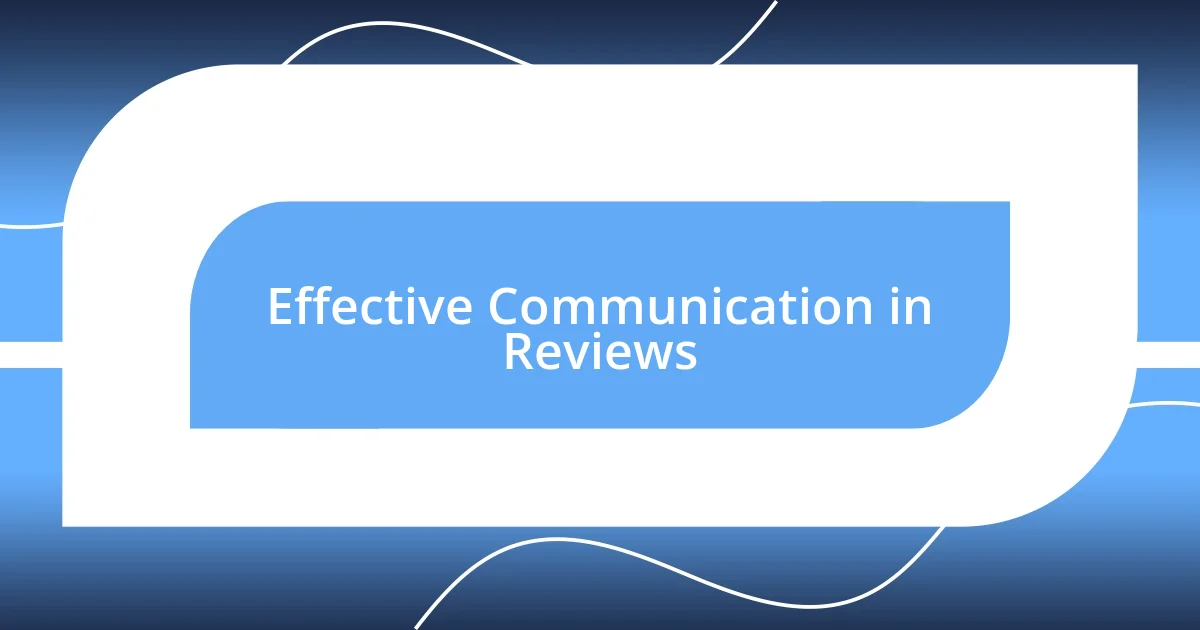
Effective Communication in Reviews
Effective communication in code reviews is essential for fostering a positive team atmosphere. I recall a time when a colleague and I engaged in what I thought was an awkward back-and-forth during a review. After some misunderstanding, we had a candid conversation about our preferred communication styles. This open dialogue not only resolved our tensions but also strengthened our collaboration and trust. Effective communication encourages clarity and helps prevent the frustrations that can arise if feedback is poorly articulated.
On the other hand, I’ve seen how vague feedback can lead to confusion and hinder growth. In one particular review session, a senior developer commented, “This could be better,” without offering specifics. I found myself puzzled, wondering what “better” actually meant in this context. That experience taught me the value of specificity in feedback; it not only guides the developer in making improvements but also illustrates that the reviewer genuinely cares about their growth. The clarity in communication makes every review session an opportunity for shared learning.
Here’s a simple comparison that highlights effective communication strategies in code reviews:
| Effective Communication | Ineffective Communication |
|---|---|
| Specific feedback with examples | Vague comments with no context |
| Encouraging dialogue and questions | One-sided criticism |
| Focusing on the developer’s growth | Highlighting errors without guidance |
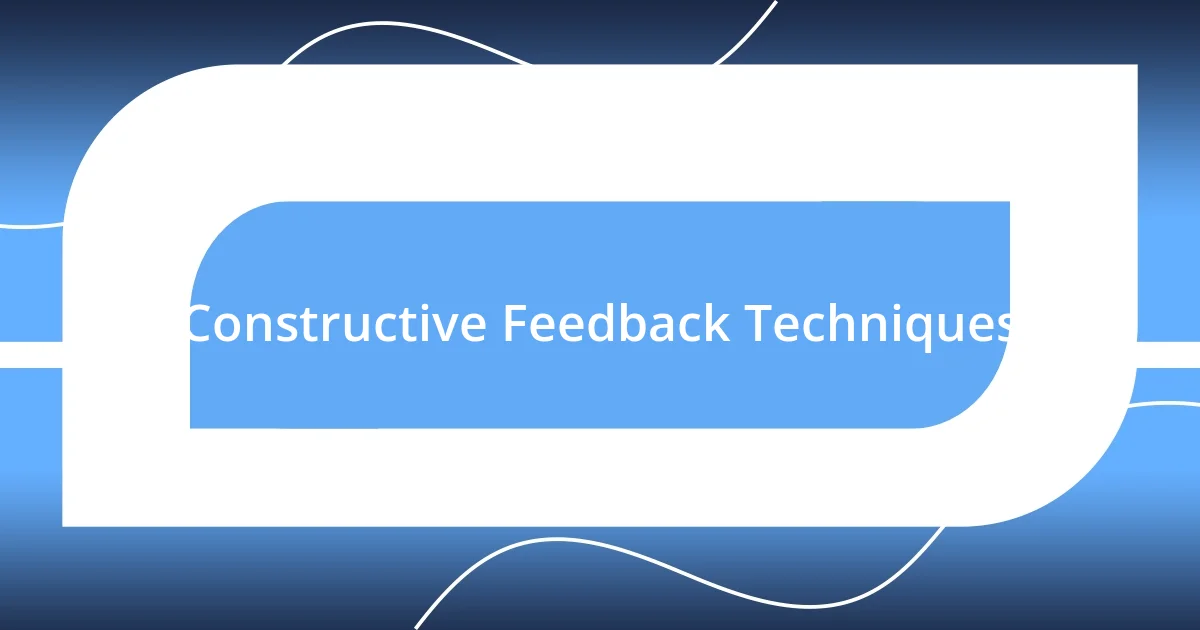
Constructive Feedback Techniques
Providing constructive feedback during code reviews requires a thoughtful approach. One technique I’ve found effective is to frame my feedback as questions. Instead of saying, “This line is wrong,” I might ask, “Have you considered how this might affect the overall performance?” This technique not only opens the door for discussion but also encourages developers to think critically about their choices. How could this shift in questioning change the dynamic of a review? I’ve seen it foster a more collaborative atmosphere.
Another key technique involves highlighting both strengths and areas for improvement. I remember a particularly informative review where I praised a colleague’s innovative solution before diving into constructive critiques. This balanced approach kept the conversation positive and motivated the developer rather than discouraging them. It also reminded me that recognizing effort and creativity can bridge the gap between criticism and support.
It’s vital to personalize feedback based on the recipient’s experience level. I once provided thorough explanations to a junior developer, understanding that they might not grasp certain concepts immediately. I could see the relief in their eyes when I broke down my feedback into digestible pieces. This adaptability not only served them well but also deepened my own understanding of the challenges they faced. Isn’t it fascinating how adjusting our approach can lead to richer dialogue and mutual growth?
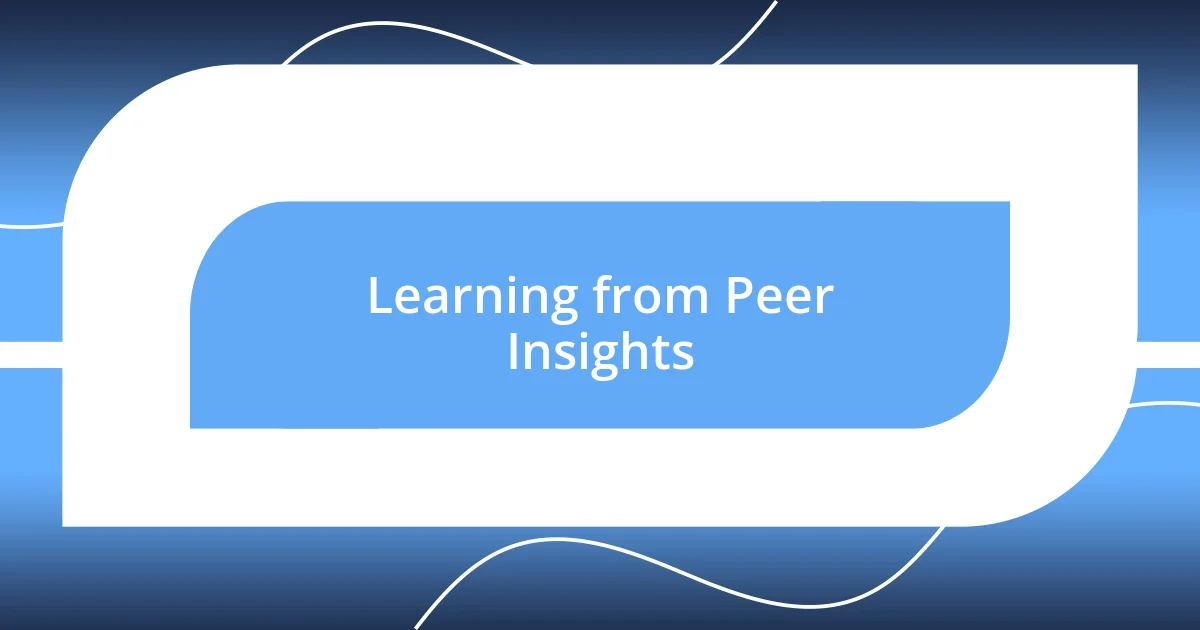
Learning from Peer Insights
Peer insights during code reviews can be a game changer. I remember a session where a coworker caught an edge case I completely overlooked. Initially, I felt a twinge of embarrassment, but I quickly realized that their perspective was invaluable. It reminded me that everyone brings unique experiences to the table, and embracing those insights can elevate our work to new heights.
Additionally, I’ve discovered that peer feedback often highlights blind spots in my thinking. On one occasion, a teammate pointed out my tendency to favor certain coding styles without considering broader team standards. At first, I was defensive, but as I listened to their rationale, it became clear how adhering to a unified coding style could enhance readability and collaboration. Have you ever had an experience where someone’s perspective completely shifted your approach? I certainly have, and those moments truly underscore the importance of valuing peer insights.
Bringing diverse opinions into code reviews not only enhances our projects but also nurtures a culture of continuous learning. I find it inspiring how sharing thoughts can spur innovation. In one memorable review, a colleague suggested an entirely different approach to a recurring problem, and it sparked a lively discussion that led to a solution we hadn’t considered. Embracing such insights creates an environment where experimentation and learning thrive—don’t you think that’s the essence of growing together as a team?
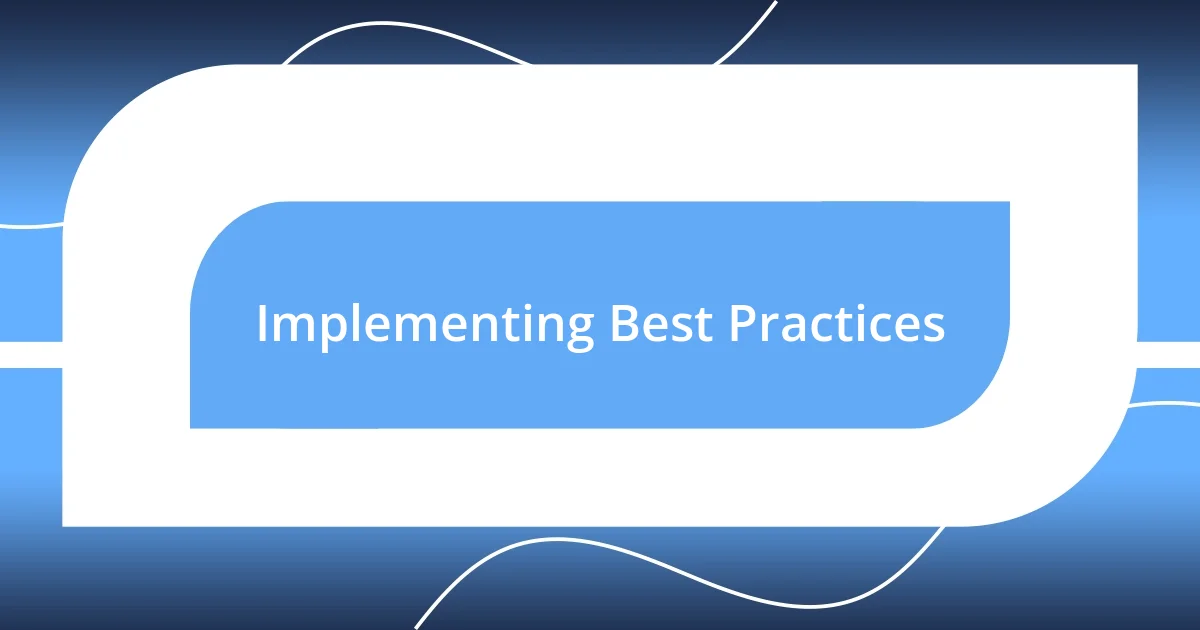
Implementing Best Practices
Implementing best practices during code reviews is crucial for fostering a productive coding environment. I recall an instance when I introduced a checklist for common best practices—things like code readability and adherence to design patterns. This simple tool not only streamlined discussions but also helped everyone remain aligned on our goals. Have you ever noticed how a small shift in guidelines can create a profound difference in team dynamics?
One technique that has reshaped the way I approach reviews is encouraging developers to think about testing early in the process. During one review session, I challenged a teammate with, “How do you envision testing this?” It opened up a valuable conversation about coverage and potential edge cases that ultimately refined their solution. It’s intriguing how asking the right questions can turn a routine review into an opportunity for deeper learning, isn’t it?
I’ve discovered that regular knowledge-sharing sessions can complement our code reviews nicely. I remember organizing a casual lunch and learn where team members showcased their favorite practices or tools. The energy was contagious, and it inspired a wave of improvements in our subsequent projects. Seeing my colleagues’ enthusiasm reminded me that learning doesn’t just happen in formal settings; it thrives in open, collaborative environments. How often do you seize such opportunities to learn from each other?
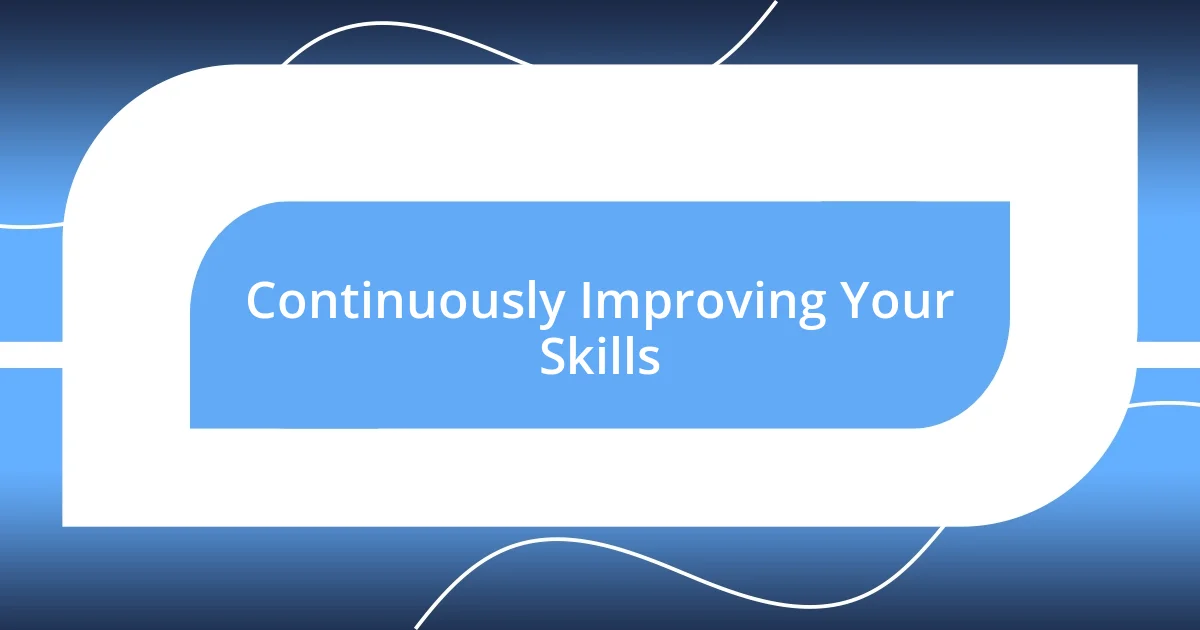
Continuously Improving Your Skills
The journey of continuously improving skills in coding is captivating. I remember a time when I decided to embrace feedback from every review—not just the highlights, but also the gnarly critiques. Initially, it felt daunting. But as I re-evaluated my emotional response to criticism, I discovered that every piece of feedback was a stepping stone toward becoming a better developer. Have you ever felt that initial sting of critique turn into motivation? It’s a powerful transformation.
Another enlightening moment was when I regularly dedicated time to explore new technologies and methods based on feedback I received. I started a small habit of setting aside an hour each week just to tinker with a tool someone suggested during a review. This time not only expanded my skillset but also enhanced my problem-solving abilities. Who would have thought that a simple routine could open doors to innovative solutions in my work?
I’ve also found that sharing my own learning journey with others solidifies my understanding. Whether it was hosting a quick demo on a new programming language or writing a blog post about an insightful review experience, teaching has been incredibly beneficial for my growth. It makes me wonder, how often do you take the time to share what you’ve learned? Engaging with others in this way fosters a rich feedback loop that nurtures everyone’s continuous growth.











